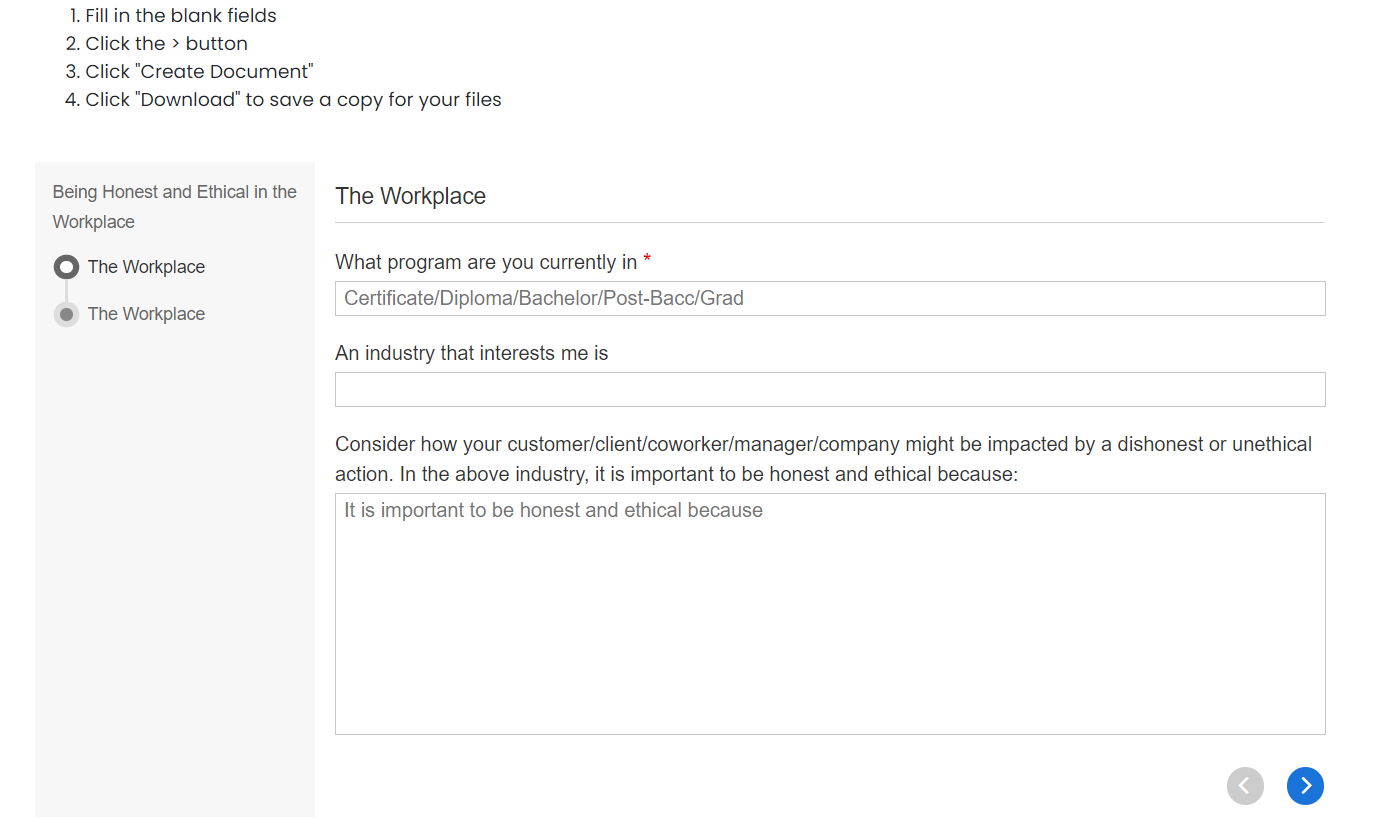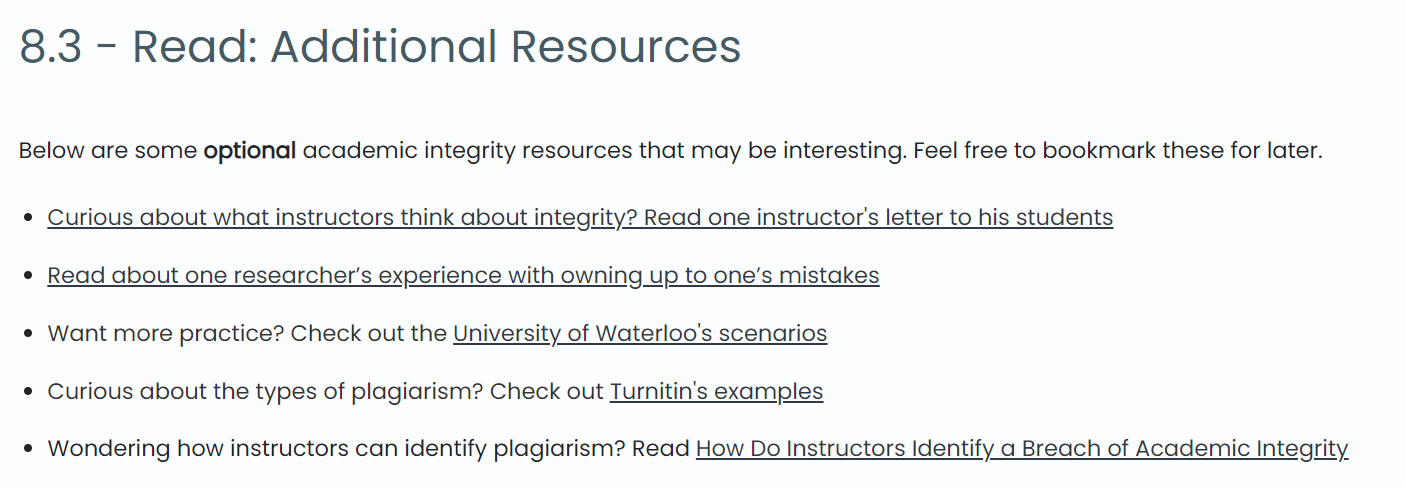Thank you for your commitment to creating a culture of academic integrity at KPU. Below are some suggestions for how to integrate the tutorial into your class. Please note that this tutorial is only an introduction and students could benefit from further reinforcement and discussion around the specifics of academic integrity within your class.
Access to the Tutorial
We encourage you to link to the Tutorial Info Page on the Academic Integrity website as the page includes helpful information for students prior to taking them to the Moodle site.
Viewing Student Completion of the Tutorial
- Click here for Instructions on how to view your student's badges in Moodle
- You may also consider having an assignment dropbox in Moodle for students to upload their badge upon completion. Information for students on how to submit their badge can be found here.
- If your student is having issues with their badge showing up, please have them email ai.tutorial@kpu.ca if they are still unable to see their badge after following the Viewing your Badges in Moodle Guide. Students may need to unhide their Badges section.
Timing
Many instructors incentivize completion of the tutorial with their students by providing bonus marks in the course or making it a requirement in their course. This revised version of the Academic Integrity Tutorial typically takes students approximately 2 hours in total to complete. Since it can be a lot of information for students to process, especially if the concept of academic integrity is new to them, we recommend assigning the tutorial in sections.
For Example:
- Week 1 – assign Chapters 1-3 to provide students with an overview of what academic integrity is, culminating in a class activity
- Week 2 – assign Chapters 4-6, culminating in a discussion post
- Week 3 – assign Chapters 7-9, resulting in the Introduction to Academic Integrity Badge which will be visible on their Moodle profile
This allows for more discussion and encourages better retention of the concepts, rather than having students cram it all in the first week and forget about it. This can also be helpful for new students to feel less overwhelmed at the start of their studies at KPU. The first page of each chapter is also unrestricted, so instructors can assign the chapters in a different order if preferred.
There is an unrestricted section in the tutorial that includes information on KPU resources available to students. Students can review this without doing the tutorial.
Activities
The tutorial is offered in an online asynchronous format, but supplementing this with additional in-class or written activities can help students better understand academic integrity at KPU.
Some examples are:
Chapter 2.2 in the tutorial includes a Padlet exercise where students can reflect on how integrity shows up in their day to day lives. The end goal here is to help students see academic integrity as a subset of personal integrity and not something separate. This could be a prompt for a class brainstorm session for students to share with a small group what they’ve noticed in their lives and what the “right” thing to do is.
Image
Chapter 3.2 in the tutorial includes examples of pledges that other KPU students have created. A class activity could be to have students come up with their own pledges and to create and sign an academic integrity declaration as a class. By making this a group activity, it encourages more accountability as well as the opportunity for students to see different interpretations of the importance of academic integrity.
Image
Chapter 5.5 in the tutorial has students reflecting on integrity after graduation and in the workplace. The intention is to encourage students to think more long-term when they make decisions. If the course is one where students are coming from different programs or different backgrounds, this could be an interesting discussion post activity for students to post their responses, respond to their classmates and to see how integrity shows up in different industries. Many students are hoping to get a job after graduation so this exercise gets them thinking about what employers are looking for. A good article for students to review is: https://ca.indeed.com/career-advice/career-development/what-is-integrity. Note: The Chapter 5.5 activity does not save in the tutorial, so it is recommended to remind students to click “Download” to save a word doc copy of their response if doing it through the H5P in Moodle.
Image
- Chapter 8.2 in the tutorial provides a cursory overview of some of KPU’s resources that can be helpful for students in upholding academic integrity. For a class activity, students could be assigned to groups and asked to look into the resources more in depth and summarize in a short presentation how the resource can be helpful for them in this class. This could be shared with the rest of the class as a presentation or as videos posted in a discussion forum. This would be especially relevant for students who are new to KPU.
Chapter 8.3 in the tutorial includes additional resources that could be the starting point for a class activity or reflection exercise.
Image
- Throughout the tutorial are many scenario examples that could be good as a prompt for a class discussion. An activity could be having students in small groups and assigning each group a scenario to role play and talk through.
Example: Chapter 7.1 - The discussion could include:
- What pressures is Amir dealing with? What are some strategies to address these?
- Although often associated with writing and exams, academic integrity also includes visuals, etc.
- What are some KPU resources that Amir can take advantage of?
- Why would there be academic integrity concerns if the work is their own (i.e. self-plagiarism)

What should students do after completing the tutorial?
Now that students have received an introduction to academic integrity, it is important to continue talking about it throughout the semester, in particular, having discussions around:
- what academic integrity in a specific course or discipline looks like, and
- what pitfalls to avoid given the specific context of an assignment or exam
- being clear about how it is important for many students to get some specific support around learning academic writing and developing paraphrasing/summarizing/citation skills
Chapter 9.6 includes information on writing and citation resources. Students are highly encouraged to work through these so that they have the necessary skills to uphold academic integrity. These could also be incorporated in your class, for example as a small assignment or for bonus marks (e.g., attend a Learning Centre Workshop).
Writing Resources
- Part 4 of the Academic Integrity Pressbook
-
- Learn about paraphrasing, how to avoid patchwriting, and strategies for note taking
-
- Attend an asynchronous workshop offered by the KPU Learning Centres "Power Phrasing: Using Information from Sources"
-
- You've been asked to use information from sources in your own words - but where do you start? In this workshop, you will learn how to create an effective paraphrase using a simple step-by-step process.
-
- Attend the Writing Mini Bootcamp offered by the KPU Learning Centres
-
- Do you have questions about the best way to write an academic essay or report? Wondering how to use information from sources by quoting, paraphrasing, and summarizing? This series of workshops will provide an introduction to the process of writing an effective academic paper.
-
- Explore other KPU Learning Centres workshops
Citation Resources
- Citation style resources created by the KPU Library
- Citation style pressbooks: APA citation, MLA citation, Chicago citation
-
- These provide an introduction to citation with many visuals and interactive exercises to test your knowledge
-
- The KPU Library also offers in-person APA and MLA citation workshops. Connect with the KPU Library to learn more.
Why do some students have multiple of the same academic integrity badge?
Have questions or ideas for the tutorial?
Email ai.tutorial@kpu.ca for questions, concerns, or suggestions around this academic integrity tutorial. The inbox is managed by the Academic Integrity Unit in partnership with the Academic Integrity Liaison Librarian.